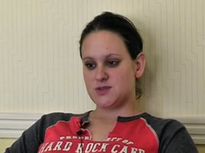Mandy

Mandy says she's always felt different to others and like she didn't quite fit in. Mandy's been self-harming since a young age, and later on experienced depression and been hearing voices. She stayed in a psychiatric unit for a while where she made two very close friends. For Mandy, time, getting involved in her care and going forwards in small steps helped the most. (White British).
More about me...
Mandy says it’s a cliché but time will help – it helped her and her friends. She also says getting properly involved in one’s care is crucial – to help build confidence and a sense of achievement. Setting realistic targets and taking small steps at a time were also important for her. Mandy says she still has her good days and bad days but she feels OK for most of the time and has learnt to accept the times when she doesn’t.
For more from Mandy see her Group Interview 11-13.


